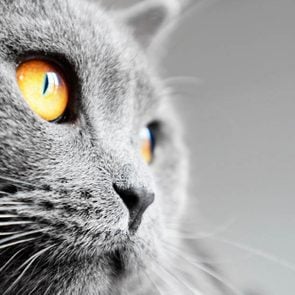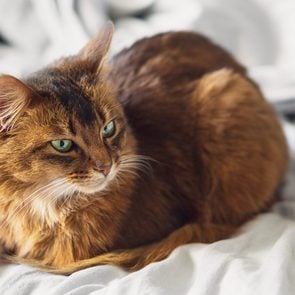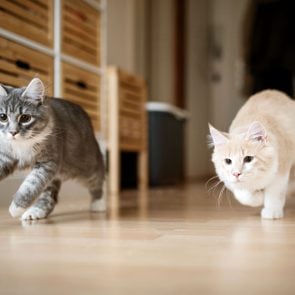Do Cats Sweat? How Cats Cool Off in the Dog Days of Summer, According to Vets
Updated: Mar. 15, 2024
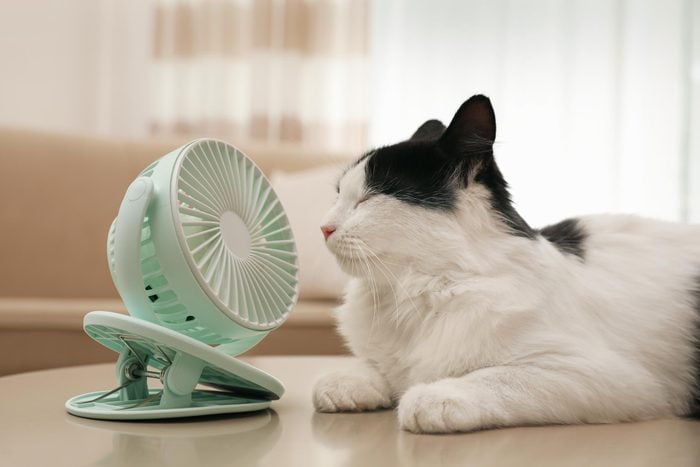
Cats never let you see them sweat. But do cats sweat, and how do they keep their cool when the temperature rises?
Sure, your dog may walk across hot coals for you, but he’s also definitely going to let you know when he’s feeling the heat. When a dog gets hot, he’ll pant, gulp water and go looking for the nearest sprinkler or kiddie pool to splash around in. (Make sure to keep an eye out for the signs of heat stroke in dogs.) Your cat, on the other hand, will greet 100-degree temperatures by sprawling out on the concrete patio—even if there’s a cool, refreshing pool mere feet away.
It’s one of the many mysteries of cat behavior (along with why cats hate water so much). But no matter how hot it is, cats are never going to let you see them sweat. Which may make you wonder: Do cats sweat? And if they don’t, how do cats cool off on super hot days? We consulted the experts about these questions and other heat-related cat facts, like proper cat body temperature, so your kitty can stay safe and cool all summer and beyond.
Get Reader’s Digest’s Read Up newsletter for more pet tips, humor, cleaning, travel, tech and fun facts all week long.
Do cats get hot?
They do—just not at the same temperature that we do. “Cats have a high tolerance for heat,” says Jennifer Hawkins, DVM, executive director of the Southern California Veterinary Medical Association. “It’s why you’ll often find them lounging in a sunbeam or sunbathing on the hot concrete.”
Cats have a normal body temperature of about 99.5 degrees, slightly higher than the 98.6 for humans. And that extra degree explains why temperatures that make us wilt seem to be just fine with our feline friends. “Our air-conditioned houses can be cold for a cat,” says Ashlie Saffire, DVM, co-owner of Faithful Friends Veterinary Clinic in Dublin, Ohio. “Cats love to be warm. They can certainly overheat just like people and dogs, but it is not very common.”
What causes cats to overheat?
Most instances of cats overheating seem to be caused by something out of their control—i.e., we put them in a carrier in a hot car or they get themselves locked in a metal shed on a summer afternoon. “Cats don’t usually place themselves in the kinds of scenarios that dogs do,” says Dr. Hawkins. “They’re not out chasing a ball in the heat of the day or running after their owner.”
Under normal circumstances, cats seem to instinctively know just how much heat they can tolerate and when they need to cool off. “Cats are pretty good at self-regulating,” says Amy Tate, DVM, co-owner of Riverview Animal Clinic in Birmingham, Alabama. “If they feel their body temperature start to creep above 104, they’ll move to the shade or somewhere cooler.”
Do cats sweat?
Well, yes and no. “They don’t sweat the way we think of people sweating,” says Dr. Hawkins. “They manage their temperature in different ways.”
Unlike humans, who have sweat glands all over our bodies, cats’ sweat glands are confined to a few specific fur-free areas, including their paws, lips and chin. That’s why you’ll never feel your cat’s fur damp with sweat, but you might occasionally see a few damp paw prints on the floor or the table at the vet’s office.
“When a cat is nervous, their toe beans get a little sweaty,” says Dr. Saffire. “Otherwise, no—cats cannot sweat to cool themselves down like humans do.”
Is cat sweat smelly?
Not to worry—your cat will never have to fret about B.O. “The smell we associate with body odor is kind of a bacterial thing,” says Dr. Hawkins. “I’ve never noticed a cat to smell from sweat or [have] any odors associated with cat sweating.”
Do cats pant?
While dogs often pant to cool themselves off and cats can too, cats are more likely to pant when they’re feeling stressed—say, when they’re in the car on the way to the vet. “Panting can sometimes be a nervous response,” says Dr. Tate. It can also be a sign of something more serious, like asthma or respiratory inflammation.
“Panting from heat or stress should be intermittent, and temporary,” she says. “It might be there, but then it will settle back down and come back again. If it’s consistent over hours, you should definitely seek help.”
How else do cats cool down?
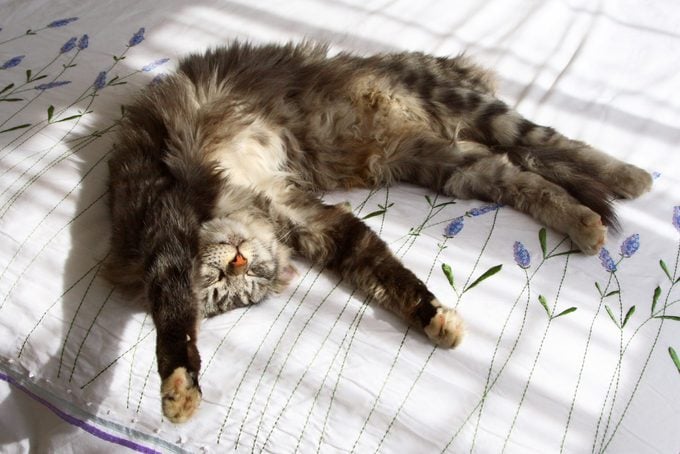
A cat’s best strategy for cooling down is simple: They lounge. When the temperature rises, they will often spread out on a cool floor, or if outdoors, bed down in a shady patch of dirt. The more they can spread out, the better they are able to exchange the heat in their body for the coolness of the ground.
“You’ll notice in the summertime they’ll tend to stretch out and open up their body and put their belly up to the sky,” says Dr. Hawkins. “They release heat that way. And they also groom themselves with their saliva, and that saliva kind of evaporates off of them and helps them stay a little bit cool too.”
How can you tell if your cat is too hot?
Because cats don’t really sweat, the best way to tell if a cat is overheating is to watch their body language. “If they are trying to sprawl out on a cold floor, it could indicate they are trying to cool down,” says Dr. Saffire. “Sometimes their ears will get very pink and warm to the touch. Knowing what normal feels like with your cat can help you detect an elevation in body temperature.”
Once in a cooler area, your cat will usually be able to cool down on his own, but it’s important to know the signs of heat exhaustion in a cat:
- Lethargy
- Disorientation
- Increased breathing rate
- Problems with coordination (i.e., wobbling when trying to walk)
- Trembling
- Drooling
- Vomiting
- Diarrhea
Serious cases of heat exhaustion in a cat may lead to heat stroke, which is a medical emergency. “Overheating can lead to dehydration and brain damage,” says Dr. Saffire. “Therefore, it is very important to seek medical care right away if you think your cat is at risk for heat stroke.”
What should you do if your cat has heat exhaustion?
If your cat is showing any of the signs of heat exhaustion, contact your vet immediately. “I always recommend calling your veterinarian and letting them know the symptoms you’re seeing at the time. They can help you determine whether your cat needs to go to the veterinarian or not,” says Dr. Hawkins. “Sometimes they need hospitalization to cool their body and make sure their organs are all functioning appropriately.”
In other cases, a trip to the hospital may not be necessary. “If it’s just a little heat exhaustion, they can usually recover quickly if placed in a cool, calm room and given some cool water and a little bit of time,” says Dr. Hawkins. Your vet may suggest surrounding the cat with ice packs, or dabbing a little water or alcohol on his paws can speed the cool-down process. But don’t douse your cat with water or do anything else that might increase stress.
Fortunately, serious cases of heat stroke in cats are rare. “The cases where I’ve seen heat stroke occur have been cats who were inadvertently stuck in an attic or garage in the summertime for several hours, or left in a car with the windows closed and the AC off,” says Dr. Saffire.
So unless your cat finds himself in a similarly dangerous situation, he’s likely to weather the hottest days of summer just fine. As Dr. Hawkins notes, “Thankfully, cats are very resilient.”
About the experts
- Jennifer Hawkins, DVM, is the executive director of the Southern California Veterinary Medical Association.
- Ashlie Saffire, DVM, DABVP, is the co-owner of Faithful Friends Veterinary Clinic in Dublin, Ohio. She also serves as a director of the American Association of Feline Practitioners.
- Amy Tate, DVM, is the co-owner of Riverview Animal Clinic in Birmingham, Alabama.

